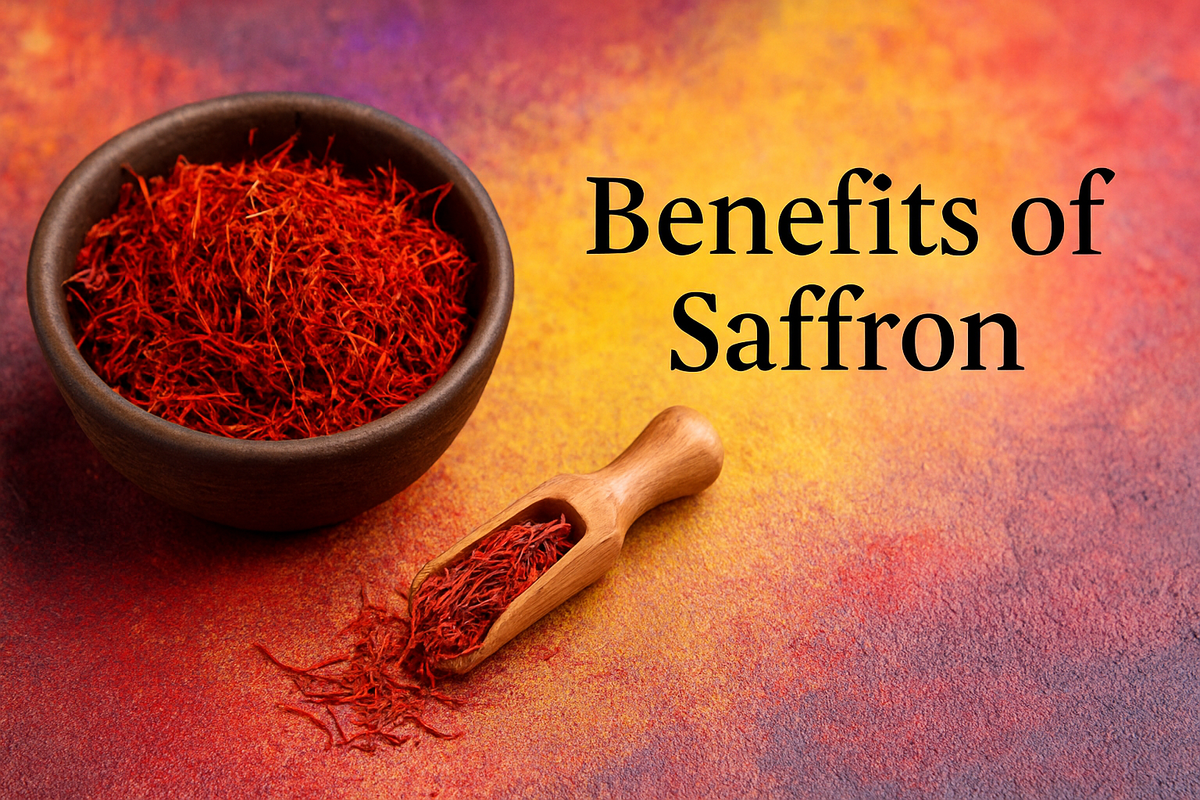Top 17 Surprising Benefits of Saffron 🌼 (Scientifically Proven!)

Saffron, often called the “golden spice,” is one of the most precious and ancient spices in the world. Known for its vibrant color, luxurious aroma, and rich medicinal properties, saffron has been used in Ayurveda, traditional Persian medicine, and even modern health practices. 💛
From enhancing mood and memory to improving skin glow and even supporting heart health, saffron is more than just a culinary delight—it's a natural health powerhouse. In this article, we’ll explore the top 17 benefits of saffron and how to use it in your daily life. 🌿
1. Natural Mood Enhancer 😊
Saffron is often referred to as the “sunshine spice” not just because of its golden hue, but also for its mood-boosting properties. It has been shown to reduce symptoms of mild to moderate depression, anxiety, and stress by increasing serotonin levels in the brain naturally—without side effects. 🌞
2. Boosts Memory and Learning 🧠
Saffron contains powerful antioxidants like crocin and safranal that have been linked to improved memory and learning. These compounds help protect brain cells from oxidative damage, making saffron beneficial for preventing neurodegenerative diseases like Alzheimer's and Parkinson’s.
3. Supports Healthy Skin 🌟
Looking for that natural glow? ✨ Saffron can help reduce pigmentation, brighten the complexion, and improve skin texture. Its anti-inflammatory and antibacterial properties make it great for treating acne and skin irritation. Saffron face masks and saffron-infused oils are popular in natural skincare routines.
4. Helps in PMS and Menstrual Relief 🩸
Women suffering from premenstrual syndrome (PMS) or irregular periods can find comfort in saffron. Clinical studies have shown that saffron can ease cramps, mood swings, and irritability during menstruation by balancing hormones and reducing stress.
5. Enhances Libido and Fertility 💕
Saffron has long been used as a natural aphrodisiac. It helps in improving libido, sperm quality, and sexual performance in both men and women. It's a natural way to improve intimate well-being without chemical medications.
6. Boosts Heart Health ❤️
Saffron can improve blood circulation, reduce cholesterol, and lower blood pressure. Its antioxidant properties protect against heart-related diseases by preventing arterial blockages and inflammation.
7. Promotes Better Sleep 😴
Saffron has a calming effect on the nervous system and may help in managing insomnia and disturbed sleep. Just a pinch of saffron in warm milk before bed can do wonders for a peaceful night’s rest.
8. Helps Manage Weight Naturally ⚖️
Struggling with hunger pangs? Saffron may help. It can reduce snacking and emotional eating by enhancing mood and reducing cravings. This makes it an ideal supplement for those aiming to lose weight in a healthy and natural way.
9. Supports Eye Health 👁️
Studies suggest that saffron can slow down the progression of age-related macular degeneration (AMD) and improve vision. Crocin, the main compound in saffron, supports retinal function and protects against oxidative stress in the eyes.
10. Strengthens Immunity 🛡️
Rich in antioxidants, vitamins, and minerals, saffron enhances the immune system. It helps your body fight off infections, reduces inflammation, and keeps chronic illnesses at bay. Perfect for the changing seasons!
11. Aids in Digestion and Gut Health 🍽️
Saffron stimulates digestive enzymes and improves the metabolism. It can relieve bloating, gas, and stomach aches. Regular use of saffron can support overall digestive health and help those with IBS symptoms.
12. Acts as a Natural Detox 🌿
Saffron supports liver function and helps in flushing out toxins from the body. Combined with proper hydration, saffron can enhance your body’s natural detox process.
13. Benefits During Pregnancy (Use with Caution) 🤰
In moderation, saffron can help in reducing mood swings, muscle cramps, and digestion issues during pregnancy. However, pregnant women should consult their doctors before using saffron supplements.
14. Reduces Inflammation and Pain 🔥
Saffron is a powerful anti-inflammatory. It helps reduce joint pain, swelling, and discomfort, especially for those suffering from arthritis or chronic inflammation.
15. Fights Free Radicals and Oxidative Stress 🧬
The antioxidants in saffron, including crocin and safranal, help neutralize harmful free radicals in the body, protecting your cells and slowing down the aging process.
16. Improves Respiratory Health 🌬️
Saffron has mild bronchodilator properties and can be used as a natural remedy for asthma, colds, and respiratory discomfort. It helps clear phlegm and soothe the throat.
17. Supports Liver and Kidney Health 🧽
Saffron aids the liver in detoxification and improves kidney function by reducing inflammation and preventing the formation of kidney stones.
How to Use Saffron Daily? 🍵
- Saffron Water: Soak 2-3 strands in warm water overnight and drink it on an empty stomach.
- Golden Milk: Add a few strands of saffron to hot milk before bedtime.
- Face Masks: Mix saffron with honey, milk, or yogurt for radiant skin.
- Saffron Rice or Desserts: Add saffron to your dishes for both taste and health benefits.
Complementing Saffron with Other Natural Superfoods 🌱
To maximize your overall well-being, saffron can be paired with other healthy, natural drinks and remedies. Two highly recommended additions include:
✅ Benefits of Green Tea
Green tea is known for its metabolism-boosting and antioxidant-rich profile. It supports fat burning, brain health, and overall detox—perfect alongside saffron for those focusing on natural wellness.
🥥 Benefits of Coconut Water
Coconut water is a hydrating, electrolyte-rich beverage. It supports kidney function, clear skin, and digestive health—making it a great companion to saffron’s healing benefits.
Frequently Asked Questions About Saffron ❓
Q: How much saffron should I consume daily?
A pinch (about 3–5 strands) of saffron is enough for daily use. Excessive consumption should be avoided.
Q: Is saffron safe for children?
Yes, in very small quantities. It’s often used in baby food in many cultures to boost immunity and improve digestion.
Q: Can saffron be taken with medications?
If you’re on medication for depression, blood pressure, or any chronic condition, consult your doctor before regular saffron use.
Final Thoughts 🌼
Saffron is more than a luxury spice—it's nature’s gift to health and happiness. Whether you want clearer skin, better mood, stronger immunity, or natural weight loss, saffron can play a powerful role in your journey to wellness.
It’s safe, natural, and incredibly versatile. But remember, moderation is key. Combine saffron with a healthy lifestyle, and don’t forget to explore the amazing benefits of green tea and benefits of coconut water to amplify your results. 💚
Let saffron brighten not just your meals, but your life! ✨





